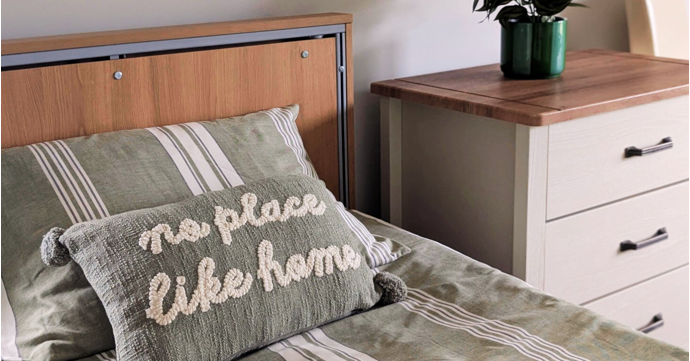Brexit, the cost of living and politicians attitudes are just some of the challenges facing the care sector — but what's it like to be at the helm?
SoGlos meets the CEO of Lilian Faithfull Care to find out...
What inspired you to get into working within the care sector?
My journey to CEO could probably be deemed as quite circuitous. I spent 15 years in retail, then I gradually made my way into the independent living sector, so we're talking mobility specialists, etc.
So, I was working with predominantly older people by then and making it so that they could live comfortably in their own homes. I moved on to a chief executive position at an organisation in Bristol, working with the NHS and local authorities to adapt people's living environments to keep them living independently at home.
That all definitely prepared me for my role at Lilian Faithfull Care because we ultimately want our facilities to feel like a home from home.
There's a reputation that care homes can be expensive, why is it important to you to maintain the Lilian Faithfull 'home for life' pledge?
As a charity that is 78 years old, Lilian Faithfull has seen care evolve and change, along with structures in society and support from local authorities.
Originally, LFC was set up to help people who couldn't afford care, but we're no longer able to do that as we don't raise enough money to be able to provide our services free of charge.
But as the care system is means tested, you can qualify for local authority funding if your income is below a certain level, but if it's slightly above, you have to pay for it all yourself. A lot of people resent that, right? Because increasingly, we're seeing parents wanting to leave things to their children and they're worried that their assets and savings will be eaten up by care fees.
Politicians are still wrestling with that and in my opinion, they're not really dealing with it.
That's why our 'home for life' pledge came in, because when you move into one of our homes, we want you to really think of it as your home — and asking you to leave if you run out of money would go against everything we stand for as an organisation.
How do you ensure a high standard of care is maintained across all of your facilities?
We are a group of care homes and each home has its own personality, look and atmosphere.
The registered home managers have a very important role to play in quality control. We're regulated by the Care Quality Commission, so there's plenty we have to put in place in order to make sure that we're compliant with them. It provides a framework of what good care looks like.
More recently, we've started to introduce digital care records that allow us to record our care more efficiently — meaning carers have more time to spend with residents and personalise care around the preferences of the individual. We also have an internal clinical governance team that work with home managers to review medication, care plans and food services, etc. to make sure standards stay high.
There's often talk of a shortage in care workers in the UK, particularly post-Brexit. Are there any challenges you've faced in recruiting and retaining skilled staff?
Brexit was definitely a challenge, alongside the cost of living crisis, we lost employees due to both of these things.
Attracting new people can be difficult, because they aren't coming for the money. Once people start working at LFC though, they realise that it's a very fulfilling role.
Something we're really proud of is the Lilian Faithfull Academy, which is an internal training and development programme — I strongly believe it is one of the reasons people do stay with us, it even attracts people from other providers.
I'd say that care isn't properly valued in society. Often it's spoken about in a way where if you can't do anything else, then you can always go and work in a supermarket or work in care.
These jobs are incomparable — and I'm saying that as someone who worked in retail for over a decade.
Care is a vocation. You can teach people to do various things, but the feeling of being a carer is something you've either got or haven't.
We employ nearly 480 people across our homes, many have been with us for decades, one was just appointed as a home manager after working their way up from the very start. Our training academy allows people to climb the ladder and achieve great things in their career in care.
How do you incorporate feedback from residents and their families in operations at LFC?
There's a number of things; we have forums for friends and families in each of our homes. So, periodically, loved ones will get together with the home managers — and I've personally been to a few of these meetings, too — and discuss needs and suggest improvements.
We also do a survey every year that goes out to every family and sometimes a family member will suggest things that we haven't thought of and we can put plans into action.
Are there any goals for the future of LFC that you're particularly excited about?
There are some really interesting technology developments using AI that we're currently looking into.
There's a system called Pain Check, which takes a quick scan of somebody's face and shows where the muscles are tight or where there is tension, this will help us to support those living with dementia who are unable to express themselves verbally and may be in pain.
Another requirement for care homes is to continuously check on residents, even at night. This obviously can be a disturbance to residents, so there's technology now that can scan the room and check on breathing patterns, snoring, anything that's perhaps out of the ordinary and the carers can intervene from there if necessary.
This can prevent falls, too, as if someone needs to get up to go to the toilet in the middle of the night, whoever is on duty can make sure that person's walker is to hand or they can go in and help them.
But for those who don't need the help, they can get the sleep that they need without disturbance which is good for their wellbeing — this may sound like a small thing but it's truly a game changer for our sector.
Are there any myths you'd like to bust about care?
The first myth would be that they're not happy, vibrant places. These are not institutions we're talking about, they're people's homes. There's lots of laughter, music and activity — I think this would surprise a lot of people, I think it would also make families feel less guilty about considering a care home to know this.
The second myth surrounds the level of responsibility required from care staff. We see some people saying 'oh, there's lots of unemployed people, let's just put them in care', or 'I couldn't be helping people go to the toilet all day'.
Care is so much more complex and rewarding than that. It's about companionship, organising activities, intergenerational linking, etc. and I would love for carers to be paid and respected on a level to reflect this.
What's been the most rewarding part of your role?
The enormity of what's required to look after 300 residents across six homes 24/7, the complexity of that is amazing and it takes a load of brilliant people to handle that. It's great to celebrate long service awards and the qualification achievements of colleagues.
So, it's not about what happened today or what happened yesterday. No two days are the same and lovely interactions happen all of the time, such as someone who hasn't spoken in weeks who will sing for the first time because a school choir came in for a visit or we'll be organising a themed party for a special milestone birthday.
I've been here for just over a year-and-a-half now and I can see how my team work so hard to improve the quality of life of each resident — I find it genuinely humbling. To see things like that every day, that's the most rewarding thing to me.
Finally, how can people get in touch to receive help and advice from Lilian Faithfull Care?
There are numerous ways people can access our help, but one of the best and easiest ways to do so would be to get in touch with our client relationship manager, Netty Wyndham-Wade. She is very experienced and understands that looking for care can be a stressful time for families.
She is very happy to answer questions and provide guidance to help you to consider the options available to you, whether you need respite care for a couple of weeks or something more long term.
If you have a question you can contact Netty by calling (01242) 303220 or emailing annette.wyndham-wade@lilianfaithfull.co.uk.




















